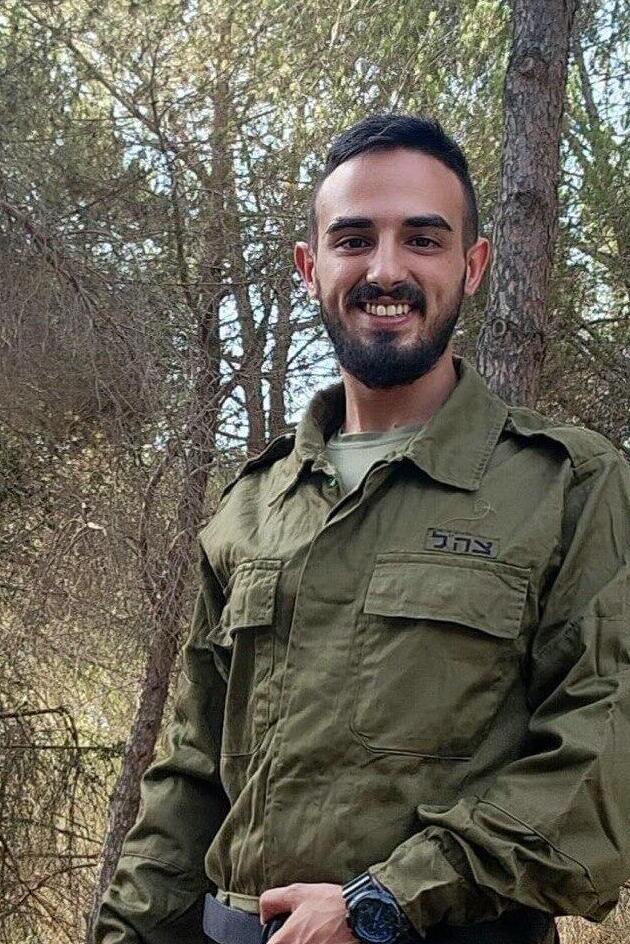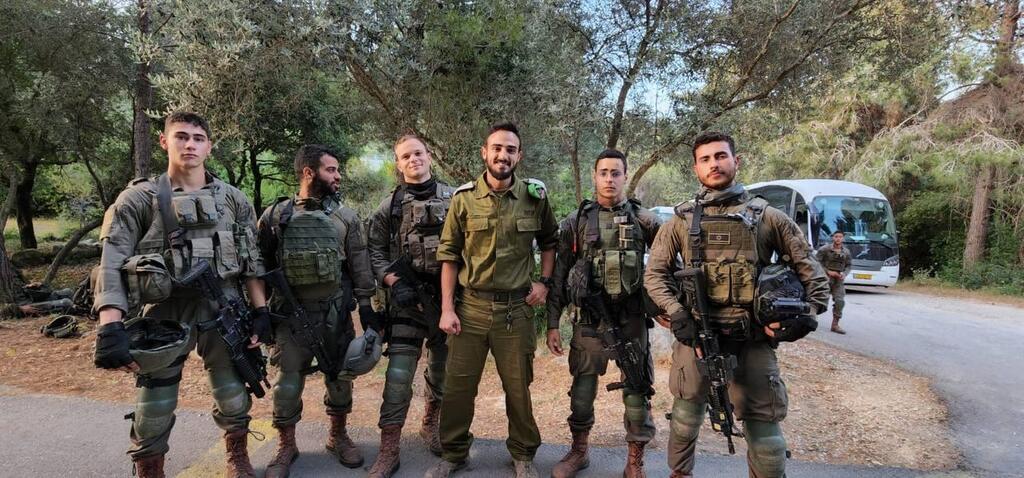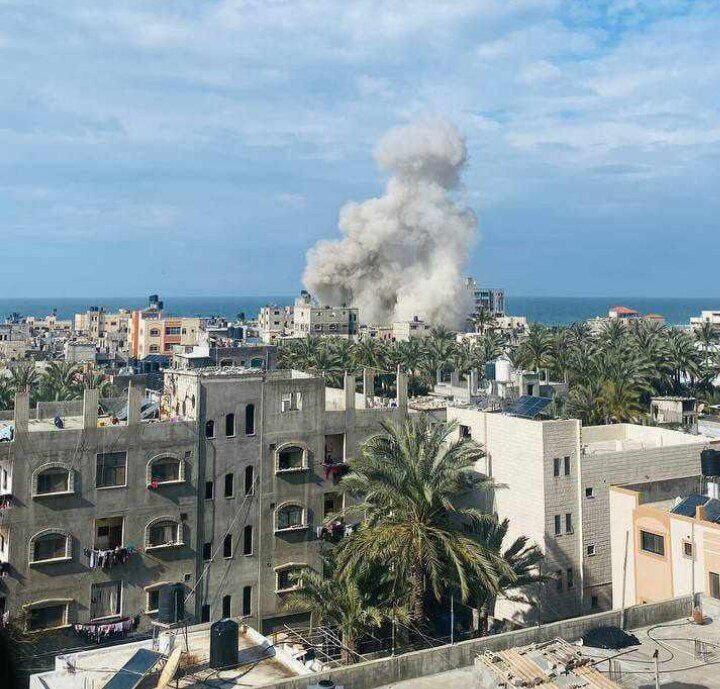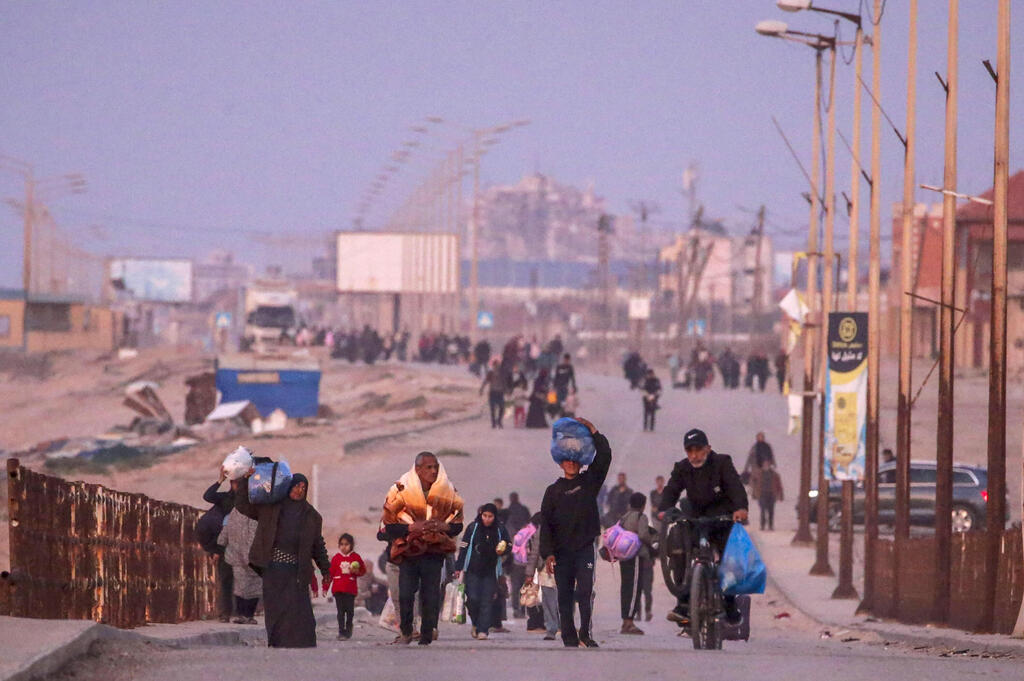Col. Richard Kemp and Arab Israeli activist Yahya discuss IDF service and war against Hamas
The war in the Gaza Strip has brought together Israelis from all different walks of life and facets of society with a shared goal of defending their home from Hamas terrorists in the wake of the October 7 attack.
Jews, Christians, Muslims, Druze, Circassians, and others stand united, showcasing diversity and camaraderie. Yahya Mahamid, an Israeli Arab speaker, educator, activist, IDF veteran and self-described Zionist, embodies this unity.
He discussed his journey with Colonel Richard Kemp, a former UK Armed Forces commander, in the Ynet studio. Raised in an Arab city to despise Israel, Mahamid shared how he grew to love the country and join the army.
"I see my service and the IDF as part of my duty to my country, Israel. As an Israeli citizen, I have a duty to my country, just like any other citizen in the world although my education growing up did not put me on this path," he says.
"Unfortunately, I grew up with a very negative image of Israel and the Jewish people, and I was put on a path of a different identity, a made-up identity. But later on in life, I realized and embraced my Israeli side and my Israeli identity, and therefore my duty, was to serve in the IDF and to protect the people of Israel and the country."
What do you mean by a made-up identity?
"Up identity made-up identity. I was told that I was not Israeli only solely on the fact that I'm Arab. I was told that I am very distant from Israel and later on I connected to the actual land and dirt of this country. When you put on that green uniform and you fight and you sweat and you bleed and you forge a brothers-in-arms relationship with your colleagues and with your fellow soldiers, you feel connected to this land. And this is a shared feeling among all soldiers in the world, soldiers fight for their country because they're connected to the values and to the flag and to the land of that country."
And did you pay a price within your own family or community for joining the IDF?
"Joining the IDF has definitely been a challenge, and one of those challenges was because going against the flow and forging a new path usually comes at a price. Unfortunately, my family excommunicated me for a few years, because of my service and even before that because of my pro-Israel opinions. And I don't blame them because some other folks in my town where I come from have endangered my family and threatened my family solely on the fact that I hold other views, different views. But on the brighter side, my company commander, when I joined the IDF, called up my mother and told her that I joined the army and he highly encouraged her to go back into contact with me and that I am her son and based on that conversation, me and my mother spoke for the first time after three years."
And I think she came to your passing out parade in the IDF when you first joined.
"Absolutely. After eight months of brutal boot camp and advanced training, in the IDF you get your beret ceremony after a very long rucksack march and my mother blessed me by coming to this ceremony at the end of my training and my uncle and I had the hard time explaining to her that all the training we did for eight months, this brutal, brutal training was for a hat, so we I was explaining the tradition of what it means, and it's a beautiful thing to see because it's a brand new experience to her. Now she knows that IDF soldiers do this and this marks their end of the training and that's how we humanize and connect both worlds."
Mahamid says that despite his Arab background, he chose to enlist in a combat role in the Nahal Infantry Brigade, in large part due to its motto - "The Human Advantage."
Mahamid says that he is not alone in his decision to join the IDF as an Israeli Arab and that other young members of the country's Arab sector are increasingly choosing to go down a similar path, especially after Hamas's October 7 terror attack, which demonstrated that the enemies of the state do not differentiate between Arab Israeli and Jewish Israelis.
Colonel Kemp highlighted the widespread narrative that the IDF is indifferent to civilian lives in Gaza, a portrayal he disputes. Kemp provided firsthand observations from his visit to Gaza, where he attended meetings with IDF commanders who were meticulously planning how to avoid civilian casualties, particularly around sensitive areas like schools sheltering refugees.
He noted the IDF's efforts to differentiate between civilian and military targets and their cautious approach to operations, emphasizing the priority of sparing innocent lives while engaging the enemy.
Mahamid emphasized that the first principle taught to IDF recruits is human dignity, underscoring it as a core value of the IDF's code of conduct. He expressed surprise at international accusations against Israel, noting similarities between these claims and falsehoods he was told as a child.
Mahamid highlighted the efforts of IDF soldiers to avoid civilian casualties, contrasting this with the actions of "Hamas-ISIS", who operate from civilian areas and use civilians as human shields, a tactic openly acknowledged by Hamas officials.
He criticized the international community's silence on these matters and cautioned against spreading misinformation about the war, stressing that it can lead to further bloodshed and exploitation of civilians by Hamas.
Colonel Kemp acknowledged that misrepresentations of the IDF as war criminals, intentionally harming civilians, provoke anger and outrage both regionally and globally. He noted such falsehoods not only risk inciting individuals to commit acts of jihad but also fuel antisemitism in countries like the UK, the U.S. and across Europe, where people may believe these narratives.
Mahamid expressed disappointment in the lack of global response to Gazans protesting against Hamas, highlighting the irony of current advocates for Palestinian rights being silent when Gazans voiced their struggles. He questioned the motives of those who only act as Palestinian activists when Israel is involved, suggesting underlying biases.
Mahamid emphasized the importance of consistent human rights advocacy, criticizing selective activism. He also addressed the rise of antisemitism, advocating for proactive measures to prevent its spread on campuses and beyond.
Drawing parallels to the prelude of World War II, he warned against the dangers of demonizing Jews and Israelis, recounting the extremism seen on October 7 as a vivid example of the consequences of such hatred. Mahamid stressed the need to combat extremist ideologies to prevent further violence.
Colonel Kemp acknowledged the natural concern people feel when seeing the devastation in Gaza, stating, "It's understandable people would be concerned about that, and they rightly should be." He emphasizes the importance of looking beyond propaganda, attributing the destruction to Hamas's actions on October 7, forcing Israel's response.
Kemp reflects on his own experience with violent riots on the Gaza border, orchestrated by Hamas, highlighting the complexity of distinguishing between civilians and combatants, and the challenges faced in such situations. He underscores the reality of the conflict, where Hamas's tactics directly contribute to the tragic outcomes observed.
Mahamid described the harrowing challenge faced by IDF soldiers when 10,000 people approached the Gaza border, attempting to replicate the events of October 7. He detailed the strategic placement of children, women and then men by Hamas to maximize civilian risk and use them as human shields. Mahamid highlighted the difficulty in distinguishing combatants from civilians, especially since Hamas operatives wear civilian clothing and engage in tactics like using IEDs and children's toys as weapons.
Despite these challenges, he emphasized the IDF's strict rules of engagement, only using live ammunition when directly threatened. Mahamid expressed his personal conflict, worrying for friends in Gaza caught in the crossfire, yet recognizing the necessity of eliminating terrorist threats for a peaceful future. "The price is high, but the results later on are much, much more worth it," he concluded.
Colonel Kemp highlighted the tactical parallels between Hamas and jihadist groups like the Taliban and al-Qaeda, particularly their use of human shields and exploiting children for military operations. He emphasized the dual purpose of such tactics: to hesitate enemy soldiers and to tarnish their image if they engage. Kemp said, "It makes a soldier pause... and if you do shoot and kill them, that's also a great thing for the jihadists."
He noted Hamas's attacks against Israel, including the significant impact of the October 7 massacre, are not aimed at defeating the IDF but rather at provoking a response that leads to civilian casualties. This strategy, Kemp explained, is designed to delegitimize and vilify Israel internationally, a cycle that encourages repeated violence. "Their intention is to compel the IDF to carry out counteraction... so that they can delegitimize Israel in the face of the world," Kemp observed.
6 View gallery
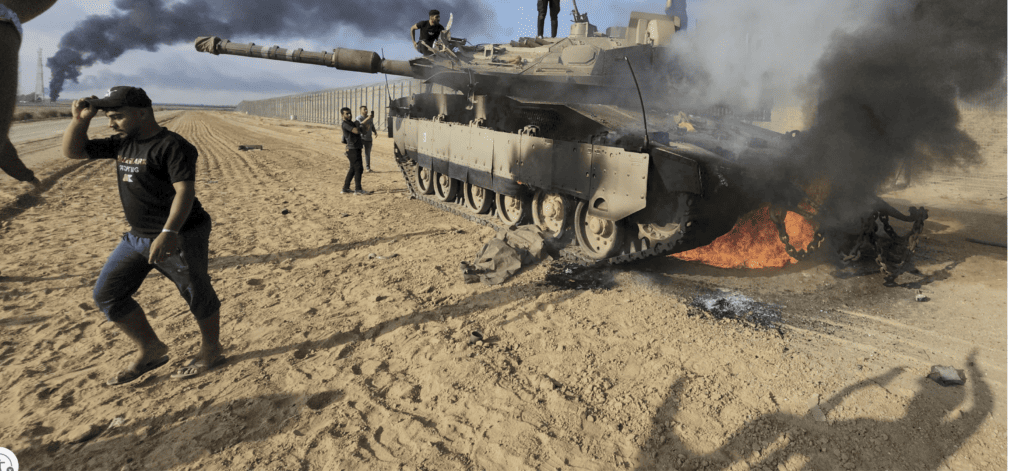

Gazans celebrating attack on Israel on top of burning IDF tank, October 7, 2023
(Photo: AP)
Mahamid concurs with the observation of terrorist organizations using civilians and children as tactics, noting that IDF soldiers have termed it a "humanitarian ambush." This strategy forces soldiers to hesitate, creating an opportunity for attackers. He emphasizes that Hamas members have confessed to employing such tactics, utilizing children and women to facilitate ambushes.
Mahamid stresses the importance of the Western world recognizing and countering these propaganda tactics, highlighting the need for educated individuals to see through these manipulative strategies. He remarks, "It is in our home, it is in our own power... to show Hamas... that those propaganda videos and ideas that cost very dearly... will not work anymore."
Colonel Kemp inquired about the level of support Hamas receives from ordinary citizens in Gaza, emphasizing a desire to understand the perspective of those living under its governance.
Mahamid observed declining support for Hamas among Gazans, especially since the riots against the group. He explained that in Gaza, "support" for Hamas is often a matter of survival, as access to basic needs and employment can depend on it. Despite this coerced "support," dissatisfaction has grown due to new taxes, nepotism and mismanagement by Hamas.
Mahamid noted, "Even with that in mind, the support for Hamas has been declining," highlighting the organization's focus on planning attacks rather than protecting or providing for the Gazan population.
He mentioned, "The average Gazans understand that Hamas spent years planning [the] October 7 massacre, and they have not planned for a single minute how to protect the people of Gaza." This has led to increasing public criticism of Hamas, both verbally and sometimes physically, within the Gaza Strip.
Mahamid reported that Hamas officials were firing at Gazans from a mosque where international aid, intended for the people, was being stored and not distributed. He described a dire situation where "the starving Palestinians in Gaza" were met with gunfire while trying to access the aid. Mahamid condemned these actions, saying, "These are starving people and Hamas plans to use them until the day they die. Until the last Palestinian is dead," highlighting the extreme measures Hamas is willing to take against its own people.
6 View gallery
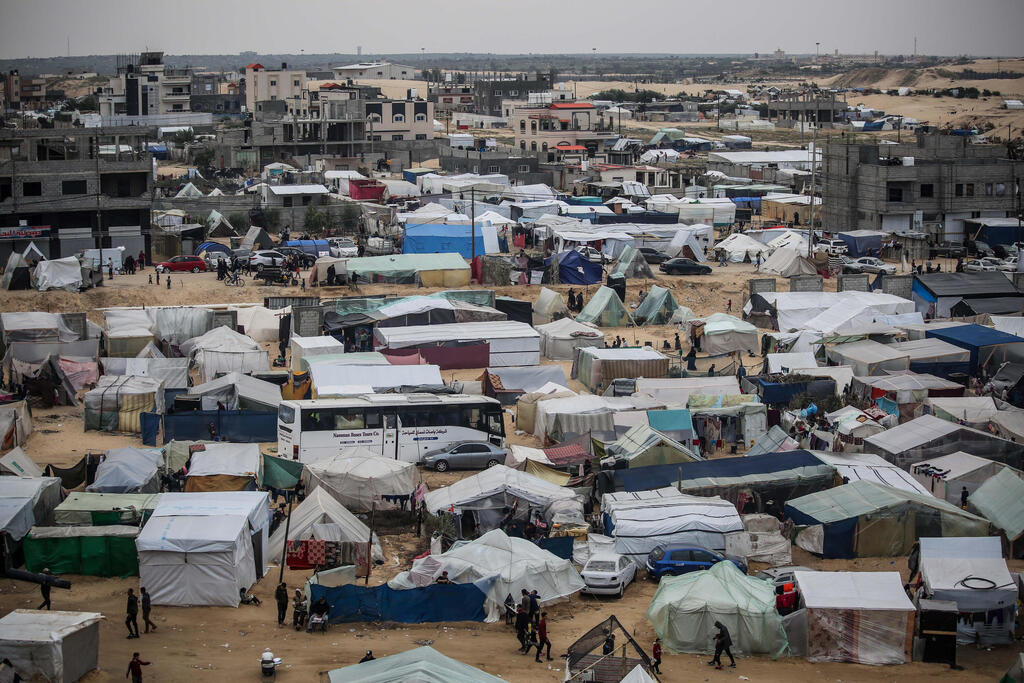

Tent city of displaced Gazans in Rafah, southern Gaza Strip
(Photo: Ahmad Hasaballah /Getty Images)
Colonel Kemp discussed the potential for a drawdown or rotational relief of IDF forces in Gaza, noting a possible change in the operational tempo. Despite this, he observed that the IDF continues to execute significant attacks against Hamas.
Kemp pondered the overall trajectory of the conflict, asking, "But how do you see the war working out? How do you see this thing playing out briefly?"
Mahamid expressed unwavering confidence in the IDF's ability to successfully complete its mission and eliminate Hamas in Gaza, ensuring that Gazan people will no longer be exploited as human shields or propaganda tools. He emphasized the importance of restoring human dignity and securing a prosperous future for Gaza, predicting a complex progression of the war but maintaining that the mission remains unchanged.
Mahamid believes that the elimination of Hamas will not only benefit Israel but also lead to a better Middle East, saying, "I think that we will achieve the mission and by that is eliminating Hamas. Finally. And I think that the world also will see a better Middle East when this terrorist organization is eliminated."
Read more:
First published: 00:17, 02.09.24





